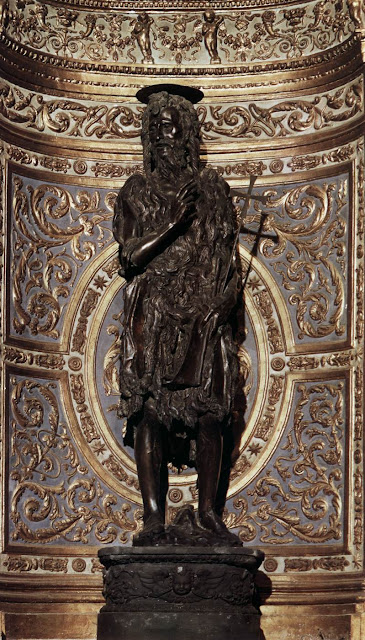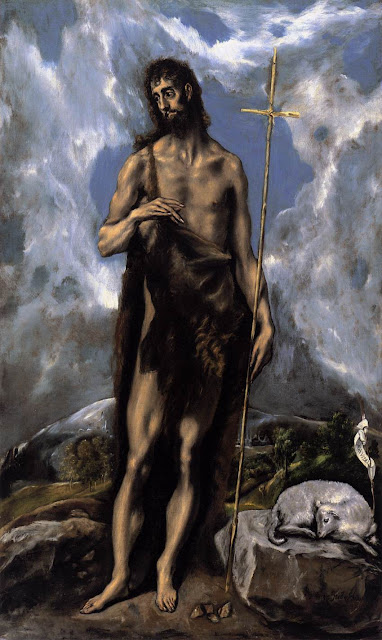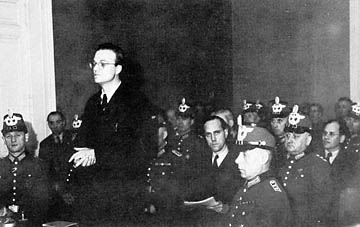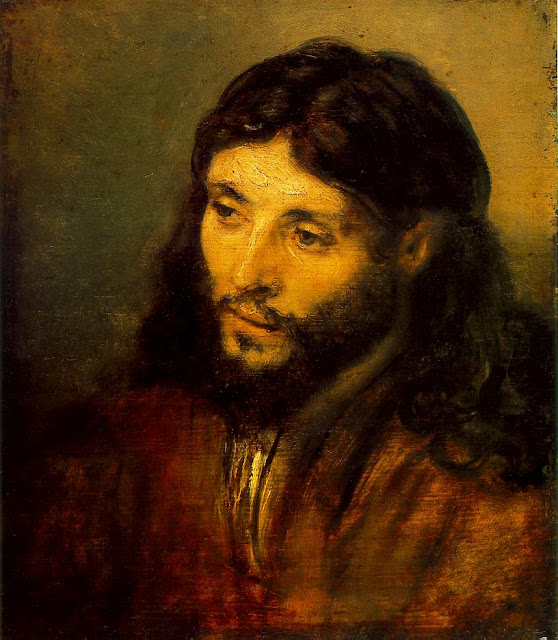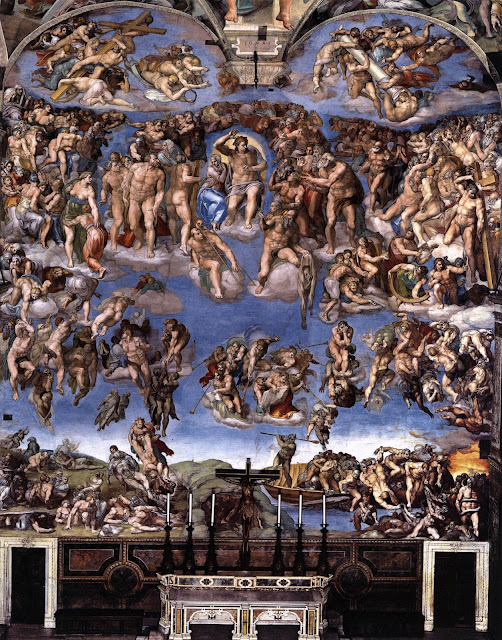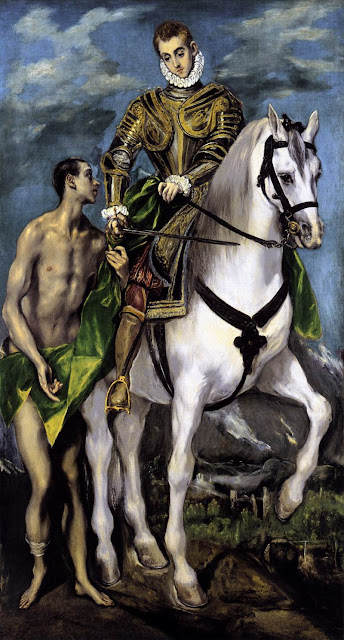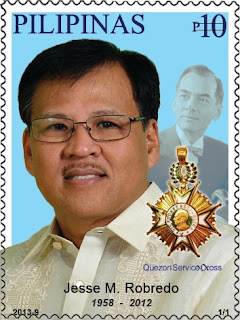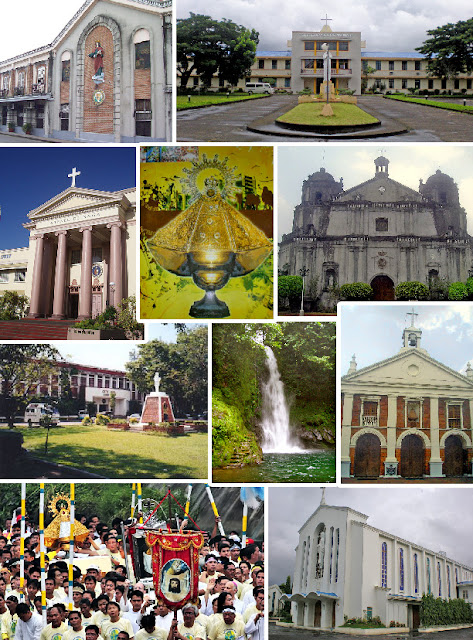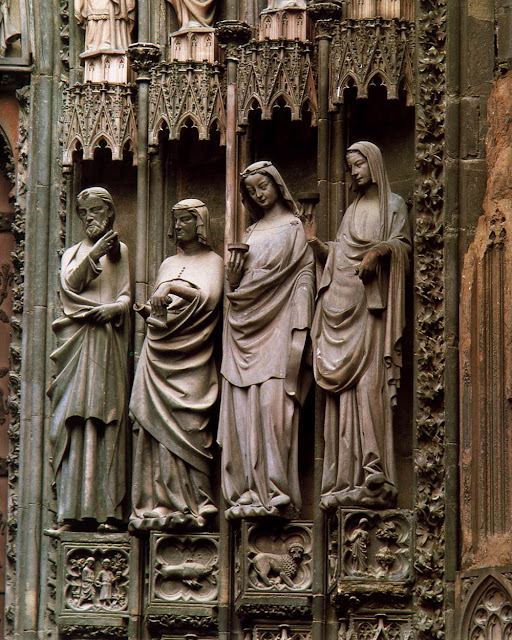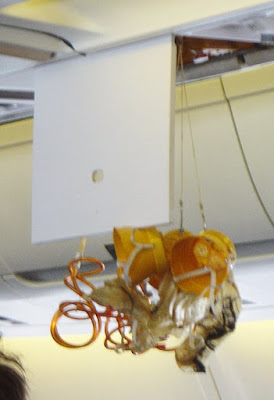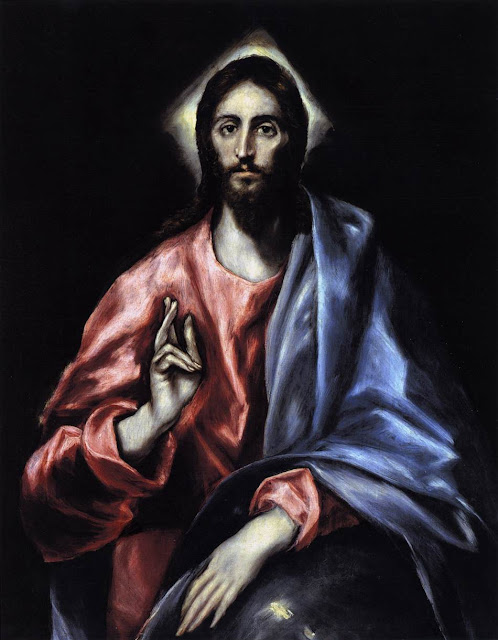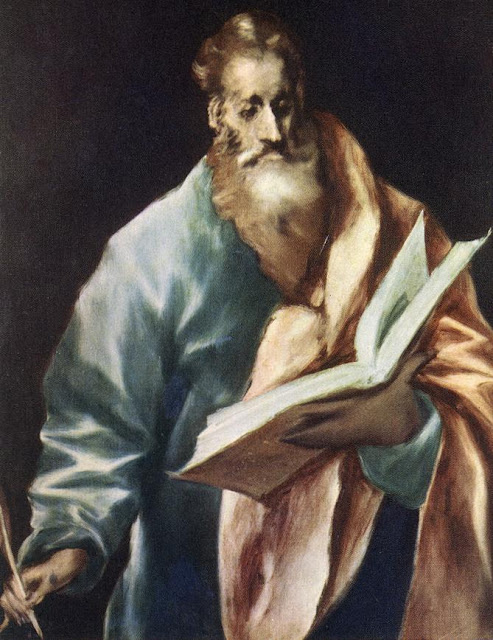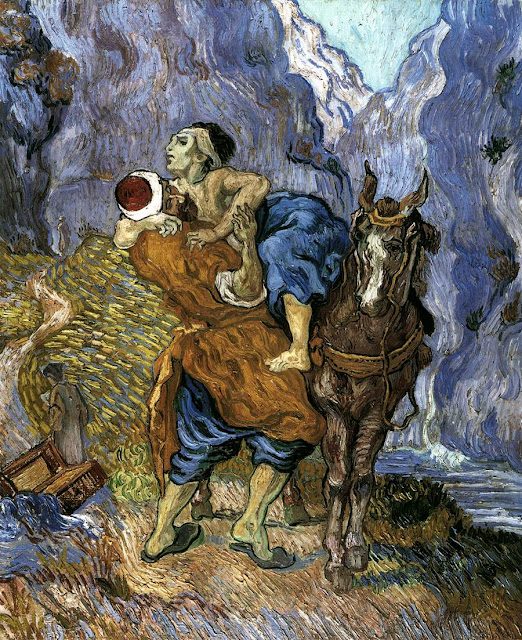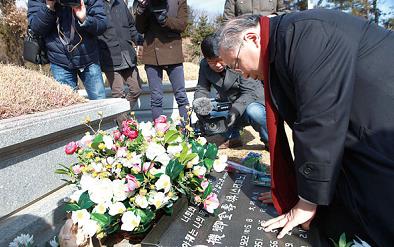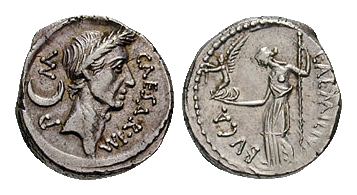‘Both Son of God and Son of Man together had one name.’ Sunday Reflections, 4th Sunday of Advent and Christmas
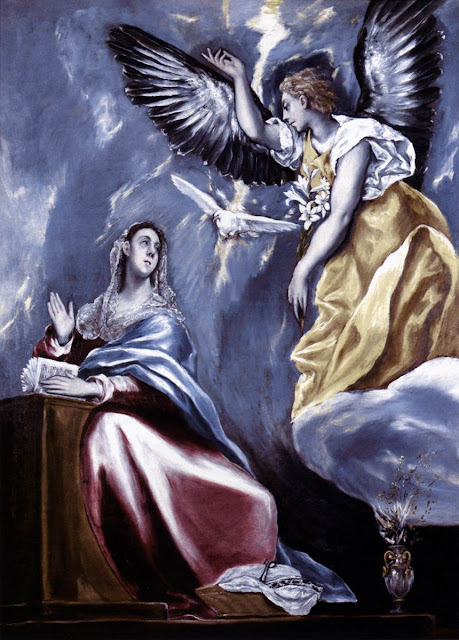
The Annunciation, El Greco [Web Gallery of Art]
Readings (New American Bible: Philippines, USA)
Readings (Jerusalem Bible: Australia, England & Wales, India [optional], Ireland, New Zealand, Pakistan, Scotland, South Africa)
Gospel Luke 1:26-38 (New Revised Standard Version, Anglicised CatholicEdition)
In the sixth month the angel Gabriel was sent by God to a town in Galilee called Nazareth, to a virgin engaged to a man whose name was Joseph, of the house of David. The virgin’s name was Mary. And he came to her and said, ‘Greetings, favoured one! The Lord is with you.’ But she was much perplexed by his words and pondered what sort of greeting this might be. The angel said to her, ‘Do not be afraid, Mary, for you have found favour with God. And now, you will conceive in your womb and bear a son, and you will name him Jesus. He will be great, and will be called the Son of the Most High, and the Lord God will give to him the throne of his ancestor David. He will reign over the house of Jacob for ever, and of his kingdom there will be no end.’ Mary said to the angel, ‘How can this be, since I am a virgin?’ The angel said to her, ‘The Holy Spirit will come upon you, and the power of the Most High will overshadow you; therefore the child to be born will be holy; he will be called Son of God. And now, your relative Elizabeth in her old age has also conceived a son; and this is the sixth month for her who was said to be barren. For nothing will be impossible with God.’ Then Mary said, ‘Here am I, the servant of the Lord; let it be with me according to your word.’ Then the angel departed from her.

The Annunciation, Gerard David [Web Gallery of Art]
The Incarnation
by St John of the Cross
Then He summoned an archangel,
Saint Gabriel: and when he came,
Sent him forth to find a maiden,
Mary was her name.
Only through her consenting love
Could the mystery be preferred
That the Trinity in human
Flesh might clothe the Word.
Though the three Persons worked the wonder
It only happened to the One.
So was the Word made incarnation
In Mary’s womb, a son.
So He who only had a Father
Now had a Mother undefiled,
Though not as ordinary maids
Had she conceived the Child.
By Mary, and with her own flesh
He was clothed in His own frame:
Both Son of God and Son of Man
Together had one name.
[Translation by Roy Campbell]
In both paintings above Mary has the word of God, the Hebrew Bible, what we Christians call the Old Testament, open in front of her. And when she says, let it be with me according to your word, she is accepting the Word. The opening words of St John’s Gospel, read at the Mass During the Day on Christmas Day and read at the end of every Mass in the Extraordinary Form, tells us who the Word is: In the beginning was the Word, and the Word was with God, and the Word was God. Further on, in Verse 14, St John writes those magnificent words that are at the centre of our faith: And the Word became flesh and lived among us.
The Catechism of the Catholic Church quotes what St John of the Cross said about this: In giving us his Son, his only Word (for he possesses no other), he spoke everything to us at once in this sole Word – and he has no more to say. . . because what he spoke before to the prophets in parts, he has now spoken all at once by giving us the All Who is His Son. Any person questioning God or desiring some vision or revelation would be guilty not only of foolish behavior but also of offending him, by not fixing his eyes entirely upon Christ and by living with the desire for some other novelty.
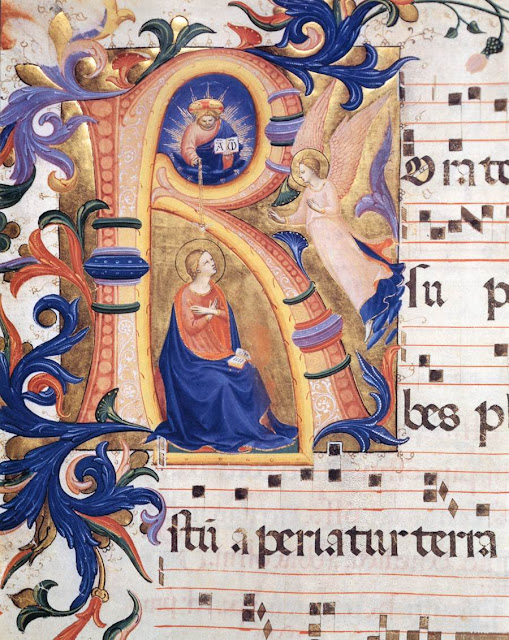
The Annunciation in an Initial R, Fra Angelico [Web Gallery of Art]
‘Silence’ is not what most of us associate with the days coming up to Christmas. But the Church invites us to enter into an inner silence during these days, difficult though that may be. The above is on a parchment, part of a Missal, which in the old days included the readings during Mass. Fra Angelico, a Dominican friar, was declared ‘Blessed’ by St John Paul II in 1982. This work again invites us into contemplation of the wondrous event of the Annunciation, the moment of the Incarnation when God became Man in the womb of Mary.
Julian of Vézelay (c.1080 – 1165), a French Benedictine monk, reflects on the silence into which Jesus entered, the silence that Mary bore in our heart, the silence that God invites us to enter at this time:
There came a deep silence. Everything was still. The voices of prophets and apostles were hushed, since the prophets had already delivered their message, while the time for the apostles’ preaching had yet to come. Between these two proclamations a period of silence intervened, and in the midst of this silence the Father’s almighty Word leaped down from his royal throne. There is a beautiful fitness here: in the intervening silence the Mediator between God and the human race also intervened, coming as a human being to human beings, as mortal to mortals, to save the dead from death.
I pray that the Word of the Lord may come again today to those who are silent, and that we may hear what the Lord God says to us in our hearts. Let us silence the desires and importunings of the flesh and the vainglorious fantasies of our imagination, so that we can freely hear what the Spirit is saying. Let our ears be attuned to the voice that is heard above the vault of heaven, for the Spirit of life is always speaking to our souls; as scripture says, a voice is heard above the firmament which hangs over our heads. But as long as we fix our attention on other things, we do not hear what the Spirit is saying to us.
Collect
Pour forth, we beseech you, O Lord,
your grace into our hearts,
that we, to whom the Incarnation of Christ your Son
was made known by the message of an Angel,
may by his Passion and Cross
be brought to the glory of the Resurrection.
Who lives and reigns with you in the unity of the Holy Spirit,
one God, for ever and ever.
- The angel Gabriel from heaven came
His wings as drifted snow his eyes as flame
‘All hail’ said he ‘thou lowly maiden Mary,
Most highly favored lady,’ Gloria!
- ‘For know a blessed mother thou shalt be,
All generations laud and honor thee,
Thy Son shall be Emanuel, by seers foretold
Most highly favored lady,’ Gloria!
- Then gentle Mary meekly bowed her head
‘To me be as it pleaseth God,’ she said,
‘My soul shall laud and magnify his holy name.’
Most highly favored lady. Gloria!
- Of her, Emmanuel, the Christ was born
In Bethlehem, all on a Christmas morn
And Christian folk throughout the world will ever say:
‘Most highly favored lady,’ Gloria!
The Nativity (Christmas)
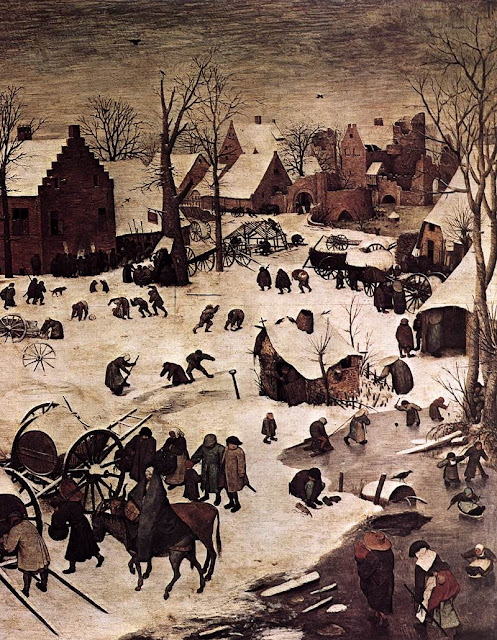
The Census at Bethlehem (detail)
Pieter Bruegel the Elder [Web Gallery of Art]
This was the moment when even energetic Romans
Could find nothing better to do
Than counting heads in remote provinces.
By U.A. Fanthorpe
This was the moment when Before
Turned into After, and the future’s
Uninvented timekeepers presented arms.
This was the moment when nothing
Happened. Only dull peace
Sprawled boringly over the earth.
This was the moment when even energetic Romans
Could find nothing better to do
Than counting heads in remote provinces.
And this was the moment
When a few farm workers and three
Members of an obscure Persian sect
Walked haphazard by starlight straight
Into the kingdom of heaven.
The Solemnity of the Nativity of the Lord has four different Mass formularies, each with its own prayer and readings. Any of the four fulfills our obligation to attend Mass. These are:
Vigil Mass, celebrated ‘either before or after First Vespers (Evening Prayer) of the Nativity’; that means starting between 5pm and 7pm.
Mass During the Night, known before as ‘Midnight Mass’. In many parts of the world it does begin at midnight but here in the Philippines since the 1980s it begins earlier, usually at 8:30pm or 9pm.
Mass at Dawn.
Mass During the Day.
When you click on ‘Readings’ below from the New American Bible you will find links to the readings for each of the four Masses. The readings from the Jerusalem Bible for the four Masses are all on one page.
Readings (New American Bible: Philippines, USA)
Readings (Jerusalem Bible: Australia, England & Wales, India [optional], Ireland, New Zealand, Pakistan, Scotland, South Africa)

